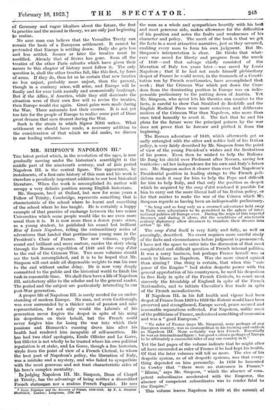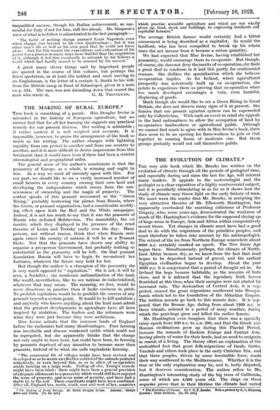MR. SIMPSON'S NAPOLEON III.* • Louts Napoleon and the Recoverg
of Frame, 1848-1856, By F, A. Simpson: lanatrated, London; Longman.; 1215. net A THE latest period which, in the revolution of the ages, is now gradually moving under the historian's searchlight is the middle part of the nineteenth century, and of this period Napoleon III. is the central figure. The appearance, by instalments, of a first-rate history of this man and his work is therefore a peculiarly important addition to our best historical literature. When the work is accomplished its author will occupy a very definite position among English historians.
Mr. Simpson, bred at Oxford, but now for some years a Fellow of Trinity, Cambridge, represents something that is characteristic of the school where he learnt and something of the school where he has taught. He is certainly a happy example of that practice of exchange between the two senior Universities which some people would like to see even more usual than it is. It is now more than a dozen years since, as a young student, he pUblished his sound but brilliant Rise of Louis Napoleon, telling the extraordinary series of adventures that landed that pertinacious young man in the President's Chair of France. The new volume, equally sound and brilliant and more mature, carries the story along through the Roman expedition of 1849 and the coup d'etat to the end of the Crimean War. Two more volumes should see the task accomplished, and it is to be hoped that Mr. Simpson will cast aside all dispensable weights to run his race to the end without undue delay. He is now very deeply committed to the public and the historical world to finish the task in reasonable time. We shall then have a life of Napoleon III. satisfactory alike to the scholar and to the general reader. The period and the subject arc particularly interesting to our post-War generation.
A proper life of Napoleon III. is sorely needed for an under- standing of modern Europe. No man, not even Castlereagh, was ever surrotmded by a thicker mist of passion and mis"- representation, for not only would the Liberals of his generation never forgive the despot in spite of his using his despotism on their behalf, but the French could never forgive him for losing the war into which their passions and Bismarck's cunning drove him after his health had rendered him incapable of self-assertion. He 4as had two chief apologists, Emile 011ivier and La Gorce, but 011ivier is not wholly to be trusted where his own political reputation is at stake, and La Goree, though a fine historian, itrote from the point of view of a French Clerical, to whom the best part of Napoleon's policy, the liberation of Italy, was a mistake and a mystery, and who failed to sympathize with the most generous and not least characteristic sides of his hero's complex mentality.
In judging Napoleon III. Mr. Simpson, Dean of Chapel at trinity, has the advantage of being neither a discredited French statesman nor a zealous French Papalist. He sees
the man as a whole and sympathizes heartily with his best and most generous side, makes allowance for the difficulties of his position and notes the faults and weaknesses of his character and policy. The merit of the book is that we get_ the facts in a most attractive narrative, just as they occurred, enabling every man to form his own judgment. But Mr. Simpson's interpretation is clear. He thinks that what- ever was saved for liberty and progress from the wreck of 1849—and that salvage chiefly consisted of the liberation of Italy ten years later —was saved by Louis Napoleon ; that if he had not made himself plebiscitary despot of France he could never, in the trammels of a Consti- tution run by French reactionaries, have accomplished that work ; that the Crimean War which put down the Czar; dom from the dominating position in Europe was as indis- pensable preliminary to the putting down of Austria. Yet Mr. Simpson, who never lets his theories run counter to the facts, is careful to show that Stratford de Rcdcliffe and the English Radical Press were more conscious and deliberate makers of the Crimean War than Napoleon, who more than once tried honestly to avert it. The fact that he and his plans for the future were the principal gainers by the war does not prove that he foresaw and plotted it from the beginning.
The Roman adventure of 1819, which afterwards got so sadly entangled with the other and nobler half of his Italian policy, is very fairly described by Mr. Simpson from the point of view of the young President's wishes and the limitations of his power. Even then he wished to help the Italians. He flung his shield over Piedmont after Novara, saving her territories and her independence for his own and Italy's future use. Mr. Simpson makes it clearer than ever that Napoleon's Presidential position in leading strings to the French poli- ticians made it easy for him to help the Pope and difficult for him to help Italy, and that only the position as despot which he acquired by the coup d'etat rendered it possible for him to carry out the more liberal half of his Italian policy, or for that matter to make the war of the Crimea which Mr. Simpson regards as having been an indispensable preliminary.
" So long and so long only as a crowned adventurer held sway in Paris were adventures to be permitted in the sphere of inter- national politics all Europe over. During the reign of this imperial dreamer, and during it alone, did the conditions of nineteenth century diplomacy allow dreamers to translate their dreams into action ' (p. 12).
The coup &dial itself is very fairly and fully, as well as amusingly, described. No event requires more careful study of the facts and circumstances before judgment is pronounced. I have not the space to enter into the discussion of that most complicated and difficult question of French internal politics. It was a sorry business, but perhaps France herself was as much to blame as Napoleon. Was she more sinned against than sinning ? One thing is certain, that when this " cut- purse of the Empire " had stolen despotic power with the general approbation of his countrymen, he used his despotism to free Italy in spite of the French Clericals, to court most sincerely the friendship of England in spite of the French Nationalists, and to initiate Chevalier's free trade in spite of the French manufacturers.
If Napoleon III. in his full health and vigour had been despot of France from 1919 to 1923 the Entente would have been preserved and strengthened, Europe saved, peace secured and reasonable reparations collected. For Napoleon, unlike most of the politicians of France, understood something of economics and was a " good European."
" No ruler of France (says Mr. Simpson), none perhaps of any European country, was so cosmopolitan in his training and outlook as Napoleon III. None certainly was less French. Essentially he was an international figure : too good a citizen perhaps of Europe to be ultimately a successful ruler of any one country in it."
Yet the last pages of the volume indicate that he might after all have succeeded as ruler of France if he had kept his health. Of that the later volumes will tell us more. The vice of his despotic system, as of all despotic systems, was that every- thing depended on him personally. In 1856 he lamented to Cowley that " there were no statesmen in France:, " Illness," says Mr. Simpson, " which the absence of com- petent subordinates accelerated with the Emperor, the absence of competent subordinates was to render fatal to
the Empire."
This volume leaves Napoleon in 1856 at the summit of
unqualified success, though his Italian achievement, so suc- cessful for Italy if not for him, still lies ahead. Mr. Simpson's view of what is to follow is adumbrated in the last paragraph :-
" The habit of seeking change pursued Louis Napoleon even when change was become to his own disadvantage ; but it was other men's ills as well as his own good that he could not leave alone. And for this reason the expenditure and exhaustion of his power was a process in many ways more fruitful than the acquisition of it, although it led him eventually to astonish by his failures a world which had hardly ceased to be amazed by his success."
A great many clever things said by important people arc quoted in the course of this volume, but perhaps the finest quotation, or at least the noblest and most moving to an Englishman, is the letter of a certain A. Smith to his wife from the British camp in front of Sebastopol, given in a note on p. 281. The race was not dwindling down that reared the



































































 Previous page
Previous page